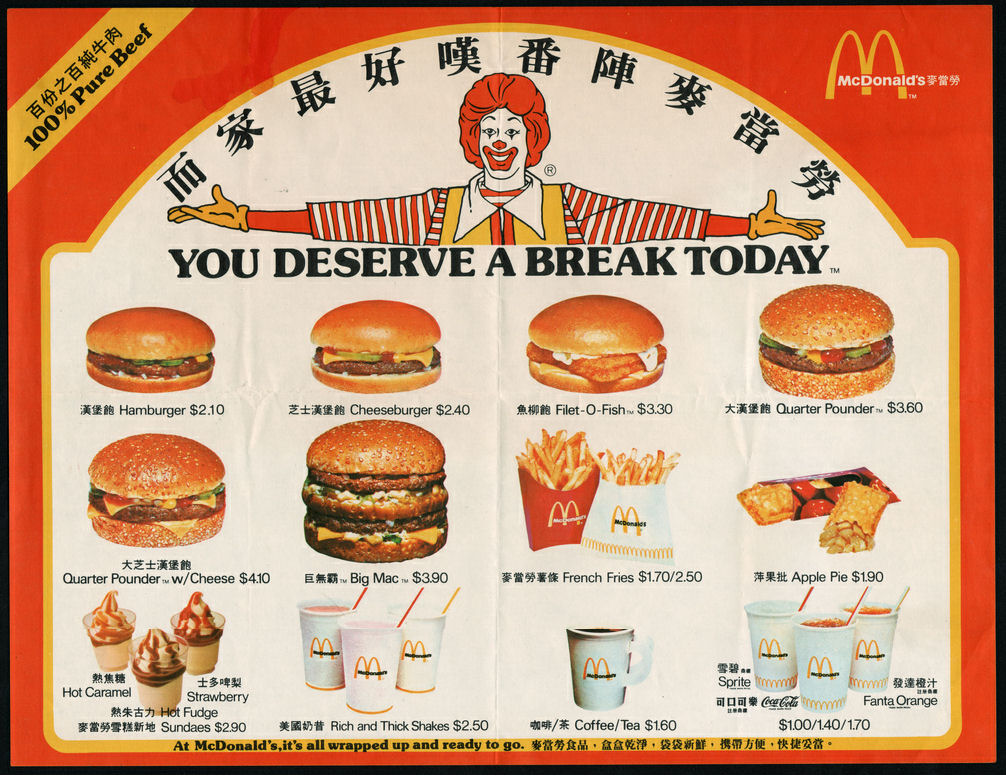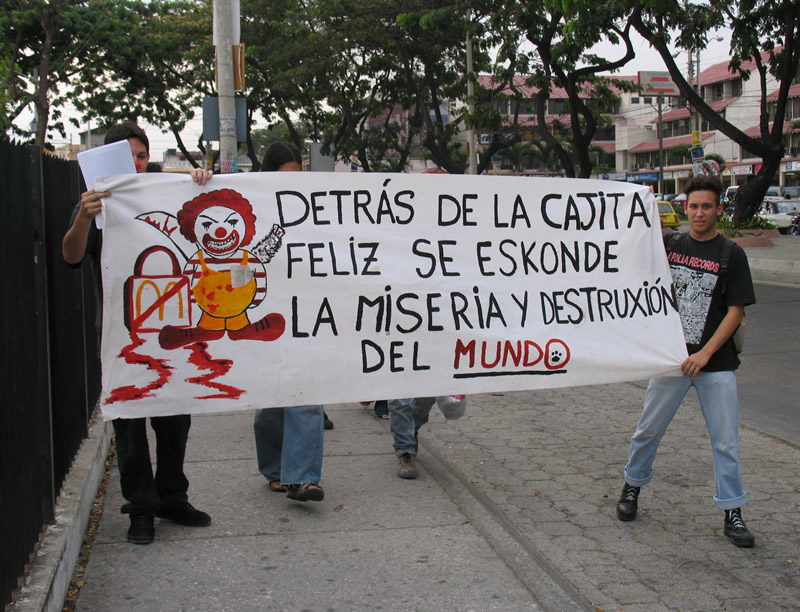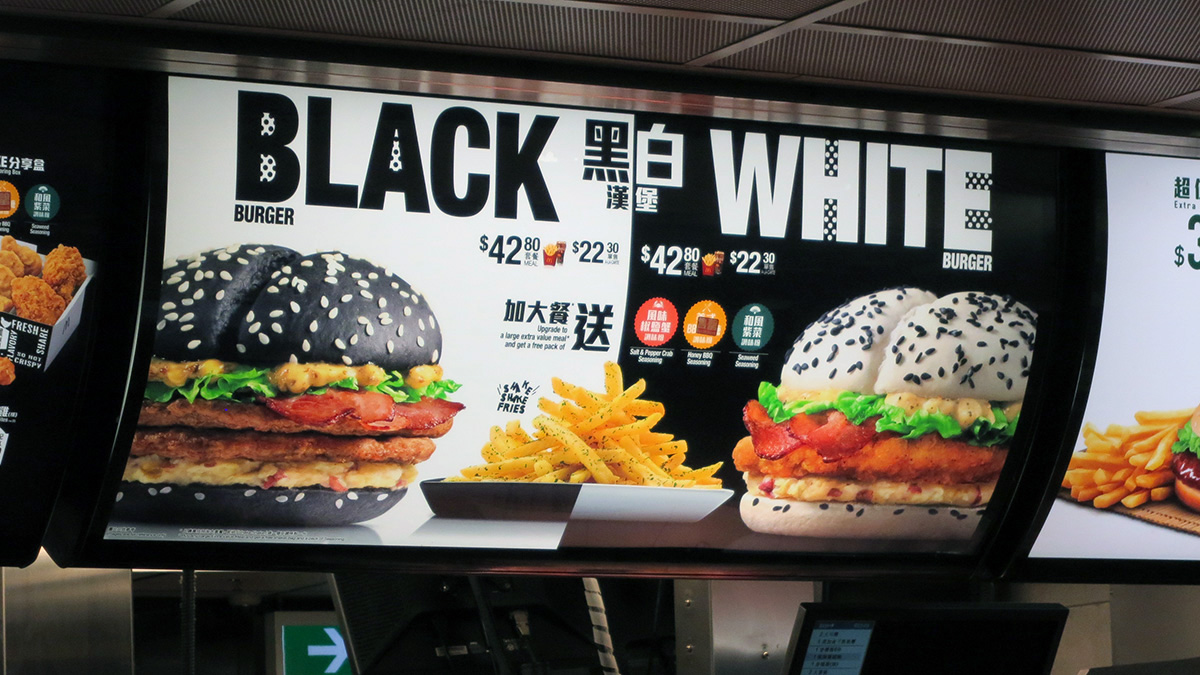Why glocalization?
In sum, multinational corporations use glocalization to overcome the resistance or indifference of consumers outside of the corporation's "home" country. To help clarify this, these slides first discuss resistance to the efforts of corporations to expand into overseas markets. They then examine two distinct ways to glocalize:
Glocalization by Modifying Origins and Meanings
- Nike (from the previous assignment)
- McDonald's France
- McDonald's Hong Kong
Glocalization by Hiding Origins and Meanings
- Yo soy Betty la fea
- Walmart dba Best Price Modern Wholesale
Corporate Strategies 1: First, standardization

McDonalds was one of the first U.S. companies to target overseas consumers. In the early 1970s, it opened stores in Asia, Europe, and Australia.
At first, McDonalds assumed that international consumers would respond in the same way that Americans had.
Resistance to the "McDonaldization" of the world
Although standardization showed some successes, it also provoked a lot of resistance. Citing sociologist George Ritzer, Wikipedia defines McDonaldization as
...the way in which ‘the principles of the fast-food restaurant are coming to dominate more and more sectors of American society as well as of the rest of the world.’
McDonaldization, continued
 McDonaldization is thus a kind of cultural imperialism, and McDonalds' attempts to open new markets has often sparked protests like the one pictured here.
McDonaldization is thus a kind of cultural imperialism, and McDonalds' attempts to open new markets has often sparked protests like the one pictured here.
Corporate Persuasion
So how do multinational corporations encourage local cultures to accept and adopt foreign influences? One key way is through glocalization.
Corporate Strategies 2: From standardization to glocalization

Beginning in the 1980s, McDonald's approach changed dramatically away from its early attempts to apply a cookie-cutter approach to its international marketing. In recent decades, McDonalds has led the corporate shift away from standardization and toward strategies of glocalization.
Glocalization
Global + Local = Glocalization
Wikipedia offers McDonald's as a key example of glocalization as a strategy pursued by multinational corporations.
Confusingly, however, the term often is used to describe two distinct approaches.
- Modify the meanings of the product and/or the brand
- Obscure the product's and/or the brand's origins
Glocalization, Approach 1: Modify
Corporations sometimes attempt to modify—but not to erase—the significance of a transnational object's origins.
The article on McDonald's France offers an excellent example of this strategy.
McDonald's didn't change the name of its restaurants in France. Part of the chain's appeal for French consumers is the brand's specifically American resonance. The company trades on this appeal while simultaneously catering to French palates (e.g. the McCamembert) and cultural values (e.g. real chairs, the "Come as You Are" ad campaign).
McDo = France
McDo = France = Youth, Individualism: “Come as You Are” 1
McDo = France = Youth, Individualism: “Come as You Are” 2
Bill O'Reilly thinks “Come as You Are” is un-American
McDonald's Hong Kong = Family
The French approach can be contrasted with a different face that the company offers to other international audiences, as the following two commercials from McDonald's Hong Kong demonstrate.
Rather than the French emphasis on youth and individuality, McDonald's Hong Kong wants the brand to resonate "family."
(However, McDonalds Hong Kong still banks on the "foreign" resonance of the brand. Customers in Hong Kong come to McDonalds because it feels cosmopolitan, not because it feels local.)
McDonald's Hong Kong = Family
McDonald's = Hong Kong = Family
Glocalization, Approach 2: Obscure
Corporations sometimes seek to completely obscure a transnational object's origins.
Most viewers of the U.S. television series Ugly Betty, for example, have no idea that part of the show's royalties are paid to the Colombians who created the soap opera Yo soy Betty, la fea, the original series from which the U.S. series was adapted. The same is true for Czech viewers of Ošklivka Katka, Chinese viewers of Chou Nü Wu Di, etc., etc. (An past version of the current Wikipedia entry once listed 25 official adaptations.)



Glocalization, Approach 2: Walmart dba "Best Price Modern Wholesale"
 As Time magazine wrote in 2009, "To deflect the attention of politicians and activists who oppose the entry of foreign multi-brand retailers, [Walmart] has named its Indian outlets BestPrice Modern Wholesale."
As Time magazine wrote in 2009, "To deflect the attention of politicians and activists who oppose the entry of foreign multi-brand retailers, [Walmart] has named its Indian outlets BestPrice Modern Wholesale."
As this image from a street protest suggests, the strategy did not work perfectly.
Two Final Examples
Both Nintendo and Toyota are Japanese companies that have been enormously successful in foreign markets like the United States.
- Is the Nintendo commercial linked from this D2L module an example of glocalization? If so, which approach does it take?
- Is the Toyota commercial linked from this D2L module an example of glocalization? If so, which approach does it take?
